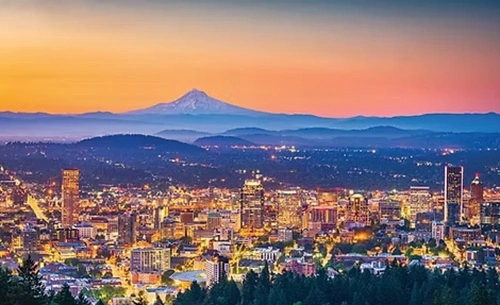Nestled in the Pacific Northwest, Oregon is a state defined by its natural beauty, progressive culture, and quirky charm. From the rugged coastline of the Pacific Ocean to the snowcapped peaks of the Cascade Mountains, Oregon offers a unique mix of outdoor adventure and urban sophistication. It’s no wonder that so many people have considered relocating to the Beaver State in recent years. But like anywhere, living in Oregon comes with both upsides and downsides. If you’re thinking of moving there, here’s a comprehensive breakdown of the pros and cons of living in Oregon.
Pros of Living in Oregon

1. Stunning Natural Beauty
Oregon is a nature lover’s paradise. With diverse landscapes including coastal cliffs, lush forests, volcanic mountains, desert plains, and serene lakes, the state is packed with scenic wonders. Highlights include Crater Lake National Park, the Columbia River Gorge, Mount Hood, and the Oregon Coast. Outdoor recreation is woven into everyday life here—hiking, skiing, camping, mountain biking, and kayaking are always within reach.
2. Environmentally Friendly and Sustainable Living
Oregonians take pride in sustainability. The state is often at the forefront of green initiatives, including strong recycling programs, renewable energy efforts, and a cultural emphasis on reducing environmental impact. Cities like Portland offer bike-friendly streets, composting programs, and support for zero-waste lifestyles.
3. No State Sales Tax
One of the more appealing financial benefits of living in Oregon is the absence of a state sales tax. This can lead to noticeable savings over time, especially when purchasing big-ticket items. While property and income taxes still apply, the lack of sales tax gives Oregon a unique edge for consumers.
4. Mild Climate (in Many Regions)
The western part of the state, particularly around Portland and the Willamette Valley, enjoys a relatively mild climate with cool winters and comfortable summers. While it can be wet, extreme heat and harsh winters are rare in many parts of the state, making it ideal for people who prefer moderate weather.
5. Progressive Culture and Creative Communities
Oregon has a strong cultural identity, especially in cities like Portland, Eugene, and Ashland. It’s known for being socially progressive, inclusive, and welcoming to artists, musicians, activists, and entrepreneurs. The state supports a thriving arts scene, local food movement, and independent businesses.
6. High Quality of Life
Oregon consistently ranks well for overall quality of life, with clean air, access to healthcare, and an abundance of public parks. If you value a slower pace of life combined with outdoor accessibility and community-minded values, Oregon delivers.
Cons of Living in Oregon
1. High Cost of Living (in Urban Areas)
While some rural parts of Oregon remain affordable, urban hubs like Portland, Bend, and Eugene have seen significant spikes in housing prices. Rent, property costs, and utilities can be expensive compared to the national average. Portland, in particular, has become less affordable for young professionals and families in recent years.
2. Rainy, Gray Winters
Oregon’s lush greenery comes at a price: frequent rain and cloudy skies. In western Oregon, especially the Portland area, winters are long, wet, and often dreary. Seasonal Affective Disorder (SAD) is not uncommon, and people who need a lot of sunshine may find it challenging.
3. Limited Public Transportation Outside Cities
While Portland has a decent public transportation system with buses, light rail, and streetcars, most of the state is car-dependent. Rural areas and smaller towns often lack reliable public transit, making a vehicle necessary for day-to-day living.
4. Wildfire Season and Environmental Risks
Like many western states, Oregon has increasingly been affected by wildfires, especially during late summer and early fall. Air quality can become poor, and evacuations have become more common in certain areas. Additionally, earthquakes and droughts are environmental risks residents should be aware of.
5. Job Market Can Be Competitive
While Oregon’s economy has grown in sectors like tech, healthcare, and green energy, the job market—especially outside the Portland metro—can be competitive or limited in scope. Certain industries, such as manufacturing and retail, have declined, and rural communities often face fewer employment options.
6. Homelessness and Urban Challenges
Cities like Portland have faced growing issues with homelessness, rising housing costs, and urban sprawl. While efforts are being made to address these challenges, they remain visible and complex. These realities can impact the overall living experience in urban areas.
Conclusion: Is Oregon Right for You?
Oregon offers a compelling blend of natural beauty, progressive values, and a laid-back lifestyle. If you’re someone who loves the outdoors, values environmental stewardship, and thrives in a creative or community-driven culture, Oregon might feel like a dream come true.
However, it’s important to go in with eyes wide open. The high cost of living in cities, the gray and rainy winters, and the environmental risks like wildfires and droughts can all affect your experience. Your enjoyment of Oregon will largely depend on your lifestyle preferences, professional needs, and tolerance for wet weather.
For many people, though, the trade-offs are worth it. Oregon offers a chance to live among nature, support sustainable living, and be part of a culture that values individuality and innovation.
Tip: Before making the move, visit both urban and rural areas of the state during different seasons. Experiencing Oregon’s varied geography and climate firsthand will give you the clearest picture of what life here really looks like.



